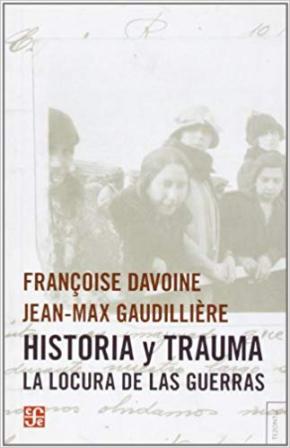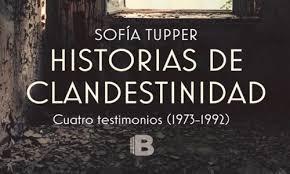What can a book do
 Some time ago, a book fell into my hands that had been written by a couple of French psychoanalysts, who for thirty years has been studying, from real cases, the connection between personal or collective trauma and madness. The book is entitled Histoire et trauma: La folie des guerres, (History and trauma: the folly of war) by Françoise Davoine and Jean-Max Gaudillière. It is a fascinating and complex work that, through the prism of multiple histories analyzed by therapists of different currents and from different places, emphasizes the need to historicize, that is, to remember with others, the blind spots that remain in people’s lives after a trauma. In other words, the only way to reconstruct the individual and social narrative is for these shadowy areas to be brought into daylight and to become real. According to the authors themselves, reflecting on the complexity of the dilemma, “what cannot be said cannot be silenced either.” All of us at some point in our lives feel relief when it is possible to share something that affects us. We realize that whoever hears us, in addition to understanding us, validates and legitimizes what we are feeling with their gaze or words, thus confirming that we are not crazy.
Some time ago, a book fell into my hands that had been written by a couple of French psychoanalysts, who for thirty years has been studying, from real cases, the connection between personal or collective trauma and madness. The book is entitled Histoire et trauma: La folie des guerres, (History and trauma: the folly of war) by Françoise Davoine and Jean-Max Gaudillière. It is a fascinating and complex work that, through the prism of multiple histories analyzed by therapists of different currents and from different places, emphasizes the need to historicize, that is, to remember with others, the blind spots that remain in people’s lives after a trauma. In other words, the only way to reconstruct the individual and social narrative is for these shadowy areas to be brought into daylight and to become real. According to the authors themselves, reflecting on the complexity of the dilemma, “what cannot be said cannot be silenced either.” All of us at some point in our lives feel relief when it is possible to share something that affects us. We realize that whoever hears us, in addition to understanding us, validates and legitimizes what we are feeling with their gaze or words, thus confirming that we are not crazy.
This book had a particular resonance for me, since reading it coincided with a new job that I had as historian in the Archivo de la Vicaría de la Solidaridad (Archive of the Vicariate of Solidarity) in Santiago de Chile. My work consisted in investigating and updating the information from the judicial proceedings documented by this institution, in defence of the victims of human rights violations in Chile between 1973 and 1990. The Fundación de Documentación y Archivo de la Vicaría de la Solidaridad (The Foundation for Documenting and Archiving the Vicariate of Solidarity) was created in 1992, to deal with and collect the information and files of the Vicaría de la Solidaridad (the Vicariate of Solidarity), as well as of the organization that preceded it, the Comité de Cooperación para la Paz en Chile (the Cooperation Committee for Peace in Chile).
The Vicaría Archives, whose budget is limited, and is run on the selflessness of those who work there, has preserved relevant documents from the Chilean history of this period, and above all, has been a fundamental source of support for the victims and their families in their search for truth and reparation.
Although much time has passed since those political events occurred, many people visit and make use of the archive. First of all, survivors themselves, who search for the evidence of their pain. But the families, children, grandchildren and great-grandchildren, of victims as well as torturers, go there too, seeking knowledge and facts involving their relatives. There are also the researchers and the students who attend the Archive knowing that there are still many stories that must be told. In today’s world, human rights archives play a pivotal role in the societies in which they emerge. Besides collaborating with justice systems, these archives preserve memory and allow the following generations to revisit their history, in order to understand their fears and so begin a process of reparation. It can be said that for many citizens these archives are an essential source to remember moments that cause them suffering even though they have not lived them.
Until now, I had only heard of the concept of post-memory. For me, this concept is extremely pertinent and it has become pressing for me to understand it. Post-memory emerges within memory studies and seeks to understand the traumatic effects inherited by later generations from those who suffered the direct effects of wars, dictatorships, and social or racial repressions. This late memory, complex and always conflictual and painful, can affect both individuals and society as a whole.
This concept was coined by Marianne Hirsch, as a way of understanding the generation Holocaust children of which she is part. In her book The Generation of Post-memory, Hirsch explains her understanding of post-memory as “the relationship that the “generation after” bears to the personal, collective, and cultural trauma of those who came before—to experiences they “remember” only by means of the stories, images, and behaviours among which they grew up. But these experiences were transmitted to them so deeply and affectively as to seem to constitute memories in their own right. Inherited memory differs from the recollections of those people themselves directly affected by the events”.
I constantly return to Hirsch’s definition of post-memory and I think that in Chile there are many stories that have not yet been told. Perhaps it is the theatre-world that leads in the production of those narratives, in that it has taken these reflections to the stage, thus allowing the public to establish a relationship with the country’s wounds as well as their own. I am thinking, in particular, of names such as Guillermo Calderón and his works Escuela, Mateluna and Discursos (School, Mateluna, and Speeches) among others.
 Works of literature and journalism have also been published that seek to research and narrate this painful stage of Chilean history from the perspective of the subjects who have lived it. Sofia Tupper Coll’s work Historias de clandestinidad : Cuatro testimonios (1973-1990), (Clandestine Stories: Four Testimonies (1973-1990)) makes clear in the first pages that “My intention is not to tell the truth. My commitment is to report the facts in the words of the protagonists themselves.”
Works of literature and journalism have also been published that seek to research and narrate this painful stage of Chilean history from the perspective of the subjects who have lived it. Sofia Tupper Coll’s work Historias de clandestinidad : Cuatro testimonios (1973-1990), (Clandestine Stories: Four Testimonies (1973-1990)) makes clear in the first pages that “My intention is not to tell the truth. My commitment is to report the facts in the words of the protagonists themselves.”
And for those who think this is all in past, and that it is not worth getting stuck in a story that happened over forty years ago, William Faulkner’s words – “The past is never dead. It is not even past” – are an important reminder. And so I invite you to see how this past continues in the present day in Chile: the past resurfaces in the National Assembly, in the words of the deputy Ignacio Urritua, who accused the victims of human rights violations of being “terrorists with grants.” But this past is also present in the response of Alejandro Fabres, detained and tortured at the age of 16, in the Letters section of the El Mercurio newspaper (21.4.18): “Sometimes it is difficult to forget. Sometimes we want to do it, but when characters such as you appear to call us terrorists for opposing a civil-military dictatorship, and because we defended ourselves from those who tried to kill us at any price, the memories remain […] I hope sincerely and with all my heart that none of your children, grandchildren, great-grandchildren or great-great-grandchildren have to experience a place of torture.”
Last year at the National Archive I attended the launch of a book, Purísima de Louquén (Purísima of Louquén), by Hernán Bustos. Surrounded by the author’s family and friends, I could feel the restorative effect that a story can engender. The book tells the life of Purísima Elena Muñoz de Maureira, wife of Sergio Maureira Lillo and mother of Rodolfo Antonio, Sergio Miguel, Segundo Armando and José Manuel. All her family were detained and disappeared in 1973. The bodies were discovered in 1978 at the execution site known as the Hornos de Lonquén (The Ovens of Lonquén). This fact has marked our entire generation. Nothing could be ambiguous, nothing could be relativized, and no honest person looking around could escape what had been lived in these furnaces, symbols of horror. It is a piercing book, a testimony to pain, injustice and barbarism. But it is also a beautiful testimony to a woman who can continue to live after hell thanks to her family’s love, and to shared sorrow and joy.
It is in this way that a book can produce in us many reactions that even we do not understand. A book can lead us to read more books; a book awakens sleeping emotions; allows us to re-examine our history and sometimes reflect on how we want to continue our lives. All of this is what a book can do.
Françoise Davoine and Jean Max Gaudilliere, Historia y trauma, la locura de las guerras, trans. Mariana Saúl, Fondo de cultura económica, Argentina, 2011.
Sofia Tupper Coll, Historias de clandestinidade. Cuatro testimonios (1973-1990), Ediciones B, Chile, 2016.
_________________
Article produced for project MEMOIRS – Children of Empire and European Postmemories, funded by the European Research Council (ERC) under the European Union’s Horizon 2020 research and innovation programme (grant agreement No 648624).